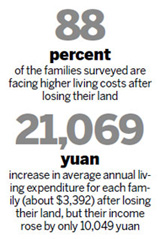Experts have urged the government to pay more attention to the livelihoods of farmers who have lost their land.
The call comes as a research report released on Friday shows that many farmers face difficulties such as rising living costs and insufficient skills training.
Some 88 percent of the families surveyed are facing higher living costs after losing their land, according to the research conducted by the Beijing-based Social Resources Institute, a non-profit organization.

After farmland and homesteads were requisitioned, the annual average living expenditure for each family increased by 21,069 yuan ($3,392), but their income rose by only 10,049 yuan, the survey shows.
Due to rapid urbanization, a large amount of farmland and many homesteads have been acquired for other uses by the government. Farmers who lost their land generally receive compensation in cash, or are moved to the cities.
The report said that although farmers are living in cities, many of them are not covered by social security as urbanites.
The report was based on a survey of 66 families in the cities of Guiyang and Kaili in Guizhou province.
The sample number was not large, but only certain samples were chosen in each area, as many farmers in the same area would give similar responses, said Li Yijie, a researcher at the Social Resource Institute, who took part in the survey.
The survey also found that more than 90 percent of families who lost their homesteads are not satisfied with the compensation payments they received. They say the resettlement payments are only sufficient for them to buy an apartment. Some farmers who were given apartments as compensation said they could not earn extra income from the apartments, according to the report.
Li said the vocational training the local government offered to the farmers was not practical. "Many farmers, after receiving the training, still raise chickens in their new apartments."
She said many women stayed at home as housewives, and were uncertain about what to do in the future.
"The local government should change its old-fashioned way of training," Li said. "It should take the farmers' ability into consideration and satisfy their real needs."
Li Ling, an associate professor at Beijing Vocational College of Agriculture, said many farmers may become poor again after using up the compensation money because they lack the skills to make money to support themselves in cities. He said his research in Beijing last year found that some farmers whose land was taken a few years ago had returned to poverty.
"Besides vocational training, psychological counseling should be offered to those farmers, as many of them have no idea about how to integrate themselves into urban life," Li said.
He also suggested local governments leave some land for production.
Sun Bingyao, an associate professor at the Institute of Sociology under the Chinese Academy of Social Sciences, said producer cooperatives should be introduced for land left for production.
"Farmers can become shareholders in a cooperative by contributing their land and getting an annual dividend from the cooperative, instead of selling all the land and getting a large sum of compensation all at once," Sun said.
According to the Ministry of Land and Resources, more then 1.27 million hectares of land was acquired nationwide from 1999 to 2005, taking 40 million farmers away from their land. The number of farmers losing their land is still increasing annually by more than 2 million and will reach 100 million by 2020.
Contact the writer at [email protected]
